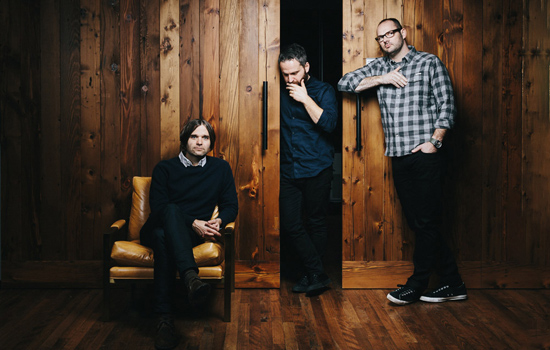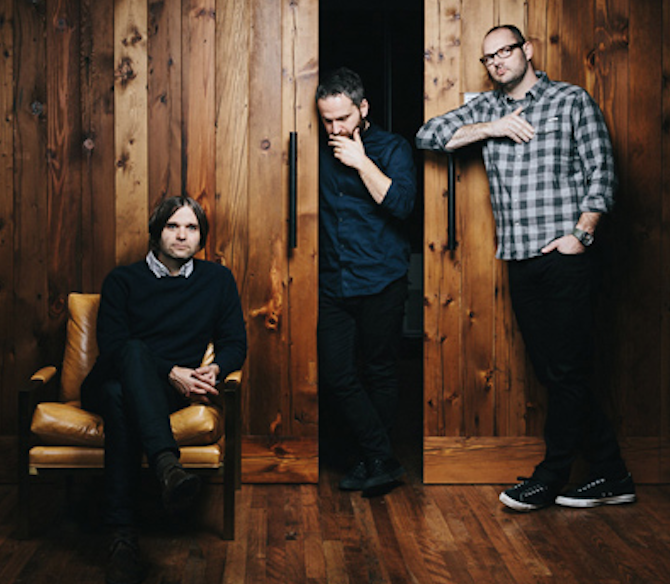
Here’s an exclusive excerpt of the current MAGNET cover story.
A lot has happened to Death Cab For Cutie since its last album. Frontman Ben Gibbard famously got divorced from Zooey Deschanel. Founding member and producer Chris Walla left the band. Yet, with the new Kintsugi, Death Cab might have made the best record of its 17-year career. MAGNET asked acclaimed writer (and longtime DCFC fan) Dave Eggers to interview the trio for us. Photo by Gene Smirnov.
Interviewing the members of Death Cab For Cutie is one of the easier tasks available to humankind. As you can see below, I think I asked 10 questions, and somehow this interview went on for an hour and ended up almost 6,000 words long. At this point, the members of Death Cab, who have been making music under that name for about 17 years, know themselves and their work, and are eloquent, circumspect and grateful all at once. They’re grateful that they get to do this for a living, and grateful for all their years with Chris Walla, who recently left the band, but remains their friend, and whose influence—in the studio and out—helped shape the band’s inimitable sound. Death Cab’s new album, Kintsugi, is their eighth, and very well might be their best. It’s their most mature, and its lyrics are arguably their most poignant and lacerating. This is a band in its prime, which has managed to make a great new record despite—and maybe because of—various personal upheavals and departures. What Ben Gibbard, Nick Harmer and Jason McGerr have to say about the process of creation, and the undiminished joy of making music going on 20 years, is edifying to anyone and all. —Dave Eggers
Dave Eggers: At this point, are you able to listen to the new album from a safe distance, to enjoy it? Or are you still too close to it?
Ben Gibbard: I always feel the most secure in the work in the period between when it’s finished and when someone that’s not a family member or close friend hears it. For us, there was a four-or-five-month period where I could just put the record on and listen to it and be proud of it without any kind of prejudice. I think my favorite time is that period after you finish it, before people hear it, when it’s truly just yours.
Eggers: Are there listeners outside of the band who are key at the early stages of an album? Someone you play it for to know if you’re onto something?
Nick Harmer: A short answer is yes, but the longer answer for me, which was unique in this particular case for us, was that this album was the first album that we worked on with an outside producer, Rich Costey. And you know, he was pretty uncompromising in his feedback along the way. I began to trust him with all sorts of stuff, like the quality and just how things were turning out. More than ever, his objective perspective was something I could really depend on because he didn’t have years of history with the band. He was hearing things in real time and was able to sort of critique us and push us along the way. I feel like bands are a little fortunate in some ways that we have someone in the studio, like Rich, who can really nudge us along right in the middle of things, even before it gets to us playing for people. If we were passing his test and he was excited about something, then I felt like, “Oh, it certainly is going to work if we play for people outside of that check point.”
Gibbard: With every record that we’ve made for years, the first person I send it to is Jenny Lewis. We’ve been friends for a long time and, I mean, it seems like we’re always playing each other our songs as we’re working on them or they’re in demo form. We’ll drive around together and say, “Hey, check this out. What do you think?” And she’s always been a supportive, but at times brutally honest, voice. I’ve always trusted her to give me the straight scoop on whatever the thing I’m working on is. Maybe the label or maybe even Jason or Nick don’t want to hear this, but I sent her the record like three days after I got the masters, you know? And obviously she’s trustworthy. [Laughs] It’s not going to end up being leaked from Jenny Lewis’ email account. But I’ve always felt like the first person I’ve wanted to listen to my records is Jenny. I want to know what she’s thinking.
Eggers: What made Rich Costey the right guy to produce the album?
Gibbard: We had kind of reached out to a number of people, and because this was the first record that Chris wasn’t producing, you know, we all felt like Chris was happy with the torch as producer, but it was going to be imperative to find somebody that he felt good about. No slight to Chris, but it’s fairly logical that if somebody has been at the helm for 17 years, and then you bring in somebody new, that person has to be somebody who is at bare minimum respected by the person who has been in charge of the studio for the past 17 years. So, Rich was somebody who Chris had had a number of good conversations with before we started the record, and he was like, “I think this guy is pretty good. I think this guy is the guy.” Rich had that going for him before we even met him, but then we met him and kind of immediately related to him. I think the thing that I appreciated most about him immediately was that he had a little trepidation at starting the project because he knew what was at stake. He knew that he was the first outside producer to work with this band, but also he was like, “Look, if I start this record, I’m going to see it through to the end. I don’t want to bail. I’m not going to just give half of myself. I’m going to give it my all.” And we all appreciated that, and we appreciated the trepidation more than we would appreciate someone jumping up and down saying they want to do it. So, he really had that going for him from the beginning.
Eggers: Inevitably, we have to talk about how the songwriting and recording process was different without Chris.
Gibbard: Well, Chris was in the studio. We made this record with Chris, and him saying that he would be leaving the band after the record was something that wasn’t a giant shock to us. I think that we had all assumed in our own way that this would be a conversation we would have at some point. Because Chris always identified primarily as the producer and also as a band member. He identified as a band member, but production has always been his number-one love, and what he has seen himself more as than a guitar player in a band. So, it was inevitable that we would come to this point. But I have to say, I think that Rich’s involvement in this record is the reason it turned out to be the way it did, and in my opinion, it’s certainly a record we are proud of. I think this as much because Rich was able to cut through all four of our ever-increasing piles of bullshit that we had kind of been adding to over the years. [Laughs] Chris got us to where we are today and I wouldn’t change a single note of any of that, but it is a very unusual way to work, to have the guitarist produce the records, and I think that once we had somebody else take over the helm, and he had nothing to lose or didn’t mind saying, “Hey that guitar part doesn’t work,” or, “Hey, those vocals don’t work.” He could come in completely objectively, with no history with the four of us. And certainly, you know, he’s not going to have to play these songs however many years the band continues on. That’s something I had never thought about until Rich was producing the record. It was like, “Yeah, Rich doesn’t have to play these songs,” so he only has to think about how they’ll sound on the album.






